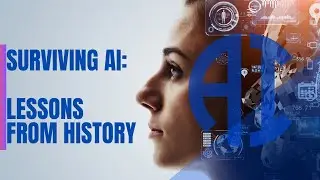Human Evolution, AI, and the Future of Society
In this video we explore how we can take lessons from human evolution and history to make AI work for us not against us. Following are the key topics the video covers
##The Homo Sapiens Advantage
Homo sapiens outcompeted Neanderthals due to our superior social and cognitive abilities. Our capacity to create and believe in interconnected stories allowed for larger, more cohesive groups, facilitating trade and cooperation across populations
##Human Need for Truth and Order
Historically, humans have sought truth and order through various means:
Religion provided both truth and order, with sacred texts often viewed as unquestionable
Fascist and populist regimes similarly enforce a single "truth" and strict order
Democracy, in contrast, allows for self-correction and challenges to established ideas, contributing to its longevity and success[
##AI and Storytelling
AI's ability to mimic human storytelling raises concerns about its potential impact:
AI-generated content can create interconnected narratives, similar to human storytelling.
The risk of AI "hallucinations" and self-reinforcing errors could lead to a dystopian future if left unchecked.
##AI in Decision-Making
The increasing reliance on AI for critical decisions poses challenges:
The COMPASS algorithm case highlights issues with opaque AI decision-making in the justice system.
Banking and loan approvals increasingly depend on AI algorithms
Social Currency and AI
The concept of social credit scores, influenced by AI, raises ethical concerns:
AI-driven scoring systems could determine social status and access to resources.
Constant monitoring and behavioral scoring may lead to a "NoseDive"-like scenario
The Future of AI
As AI continues to advance, we must consider both its benefits and potential risks:
AI could accelerate scientific breakthroughs, such as cancer research and aging solutions.
The risk of AI manipulation in the hands of authoritarian regimes is a significant concern.
To ensure AI benefits humanity, we should focus on:
1. Benevolence: Designing AI to work for human benefit, not manipulation.
2. Decentralization: Preventing single-entity control over AI.
3. Mutuality: Establishing reciprocal monitoring between AI systems and their users.
4. Flexibility: Maintaining human control and the ability to correct AI systems[4].
By learning from our evolutionary history and approaching AI development with caution and foresight, we can harness its potential while mitigating its risks, ensuring a future where AI enhances rather than threatens human society.



















